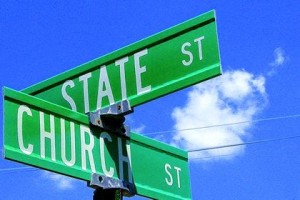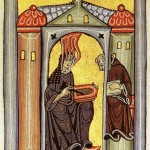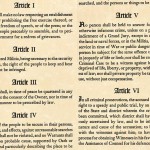 There is much that’s wrong with faith in politics today, but not just in how it is abused; also in how it is attacked. And there is plenty that’s right about it too.
There is much that’s wrong with faith in politics today, but not just in how it is abused; also in how it is attacked. And there is plenty that’s right about it too.
One way of approaching religious issues is fear-based: there are threats to our faith; there are threats to our personal salvation; there are threats of being punished by God for misbehavior. And, of greatest concern in the political realm, is fear that there are threats to the Christian community. It’s not enough to live a godly life; it is necessary, it is appropriate, to attack or at minimum repel those you see as not being godly. This view comes from a tribal society where survival was tenuous. In early Hebrew Scripture you find all sorts of directives based on putting the security or harmony of the community ahead of the individual; rules that shun or expel or execute people that might bring disharmony, using disproportionate message-sending responses. Those who can’t breed (and thus drain resources without creating new members) are shunned. Unruly teenagers are stoned to death — “so you shall purge the evil from your midst.” (Deuteronomy 21:21) The same attitude continues in some Christians today, though they may have softened the disproportionality.
But there also has been a thread through abolitionism, temperance, women’s suffrage, civil rights, and the anti-war and environmental movements, of invoking Christian themes — to see that of God in every person and that all are equal under God, to care for the “least” of us. While, to me, love is a higher standard than fear, this also is intruding with your opinions on the public sphere. I believe that exploiting the environment is an offense against God, an abdication of our responsibility to be stewards of Creation, but someone else’s spiritual views or absence of any spiritual beliefs may lead them to think it’s a non-issue, that there is no moral component. What gives me the right to impose my view?
I think everyone has the right to promote their moral views in the political realm. If you are pro-life and believe abortion is an offense against humanity and against God, I think you have every right to advocate for its being criminalized. It doesn’t mean that you should prevail in a secular democratic society unless the law and the public agree with you, but you can make your case. A lot of my friends on the Left disagree with that. They see the Right’s pursuit of turning religious rules into law as being inappropriate and argue, with the new atheists and ACLU, that separation of church and state means forbidding any intrusion of faith into the state. That’s certainly not what our founders intended.
I think, first of all, that it’s a meaningless idea, because atheists and agnostics and spiritual-but-not-religious folks, and everybody else who isn’t part of an organized religion, has their beliefs, their faith. Atheist scientists believe in the constructs, the theories and the presumptions that are part of the atheist scientific worldview — they believe the scientific method is the best way to comprehend truth, that something unprovable by the scientific method can be rightly ignored, and also in a host of theories (not facts, note, theories) from the theoretical sciences, like evolution, quantum mechanics, the Big Bang, string theory, the multiverse, dark matter, etc. I believe in a lot of that too. I’m just saying they are beliefs.
I am not being relativistic in saying this; I believe certain things are True and that other people are often wrong. My point is that everyone has a belief system; everyone has faith in things that haven’t been proven to them face-to-face. So to say that in the political sphere or the public realm Christianity is forbidden but that all other belief systems are allowed, or that organized religions are forbidden but softer less structured spiritual things are OK, makes no sense to me. And to expect our leaders to be driven not by beliefs, but by some cold rationality is not only wrong; it could be dangerous.
Extreme secularism
It’s absolutely true that our founders were not the Christian pillars that fundamentalists want us to believe they were. They included a wacky mix of transcendentalists, universalists and Masons, among other things, but they did not intend to ban spiritual concepts from the public sphere. As is quite obvious, they wrote them into our founding documents. What they were making sure did not happen was what they’d seen in Europe, in England and elsewhere, where there’s an official state church and having other beliefs is criminalized. They had seen people executed, imprisoned and deported for their faith. Beyond criminality and executions, there was the more modest problem of corruption where church is connected to power.
What the founders were out to avoid in America was a Church-based state, a state church, and any persecution by the state for beliefs. So the two parts of the freedom of religion in America are, first, that you can practice any religion you want, and second that there is no state-sanctioned church. In order to assure this, the founders established absolute freedom of religious expression and also created a firewall to do with laws and taxation and such, so the government cannot favor one religion over others. But none of that has anything to do with people talking about faith; presidents or congresspeople saying what they believe; people being motivated by faith. As people of faith will often point out, the civil rights movement and the anti-slavery movement were both led by religious leaders. One of the most beloved figures on the left, Martin Luther King, Jr., was a preacher who was constantly invoking Christian messages in his political activity. The aggressive role pursued in recent years to eradicate any mention of God in the political sphere just makes no sense to me.
Mixing religion and politics
The Right incorporates faith into the political realm a lot more than does the Left. I think there’s one very obvious reason for that: the religious right has a much bigger voice within the Republican Party than does the religious left in the Democratic Party. Those on the left for whom faith is a central organizing principle of their politics and their life learn early on that voicing that fact is unwelcome in many circles. So they tend to avoid being overtly religious in their conversations — not only political conversations but all conversations — unless they can tell it’s a “friendly” environment. I don’t know if this is the legacy of socialism, with its hostility towards religion, or what, but it is the reality.
On the modern right, it’s a given that those representing an evangelical Christian viewpoint can speak their mind and draw the connection to politics whenever they want. As I’ve mentioned before, my father was a conservative atheist. It used to be more common to find people on the Right whose conservative principles were grounded in belief in progress, science, education and rational intellectual pursuits. Ayn Rand, who just popped up this election cycle because of Paul Ryan’s devotion to her, is a great example. To her, collectivist behavior, as in socialism, and group behavior, such as in religious communities, were equally dangerous.
One of the big shifts in recent decades has been the reclaiming of religion on the Left, which had long allowed the religious right to “own” the topic of faith in the political conversation. In recent years, some Democratic political leaders like Hillary Clinton and President Obama have been unhesitant in their use of religious language and imagery.
President Obama has consistently used rhetoric in his speeches that borrows from the progressive Christian tradition, echoing social justice messages reminiscent of those who’ve gone before, like Mario Cuomo and Martin Luther King. The language is always inclusive and focused on principles, though, such as our responsibility to others and people’s God-given worth. I believe this is an important step for the Democratic Party, and for progressive politics generally, to build a broader coalition going forward.
One of the most surprising things to me in this election cycle has been the apparent ease with which Mitt Romney has garnered the support of evangelical Christian Republicans. Because, quite frankly, historically many evangelical Christians and a number of other Christians have considered Mormonism to not be part of Christianity and, seeing that none of those doctrines have changed — a Mormon baptism still does not count as a Christian baptism for a number of denominations, including the Catholic Church — it is surprising to me how easily Mitt Romney has gotten their support. In many ways I see this as a positive. Governor Romney has spoken to the beliefs they share, and I’m pleased that they’re willing to judge his worth on this. I’m sure for some it’s cynical but for many I get the impression they’ve decided he’s a good man. So, that is encouraging.
Overall, I think America is a unique experiment in building a secular pluralistic democracy that isn’t hostile towards religion. Religious affiliation and participation in America is high compared with other democracies, and I think that’s wonderful. I think the extreme secularists have it completely wrong when they see religion as the problem, especially when secularism is responsible for many of the problems. I welcome the inclusion of religion in the political sphere within the bounds set up by our founders. It’s a messy thing trying to allow a free contest of ideas in a pluralistic society. It would be easier to say no one can express their religious views, but what fun would that be? This grand experiment has had its ups and downs, but I believe it is still working towards a more perfect union.
 Content Director’s Note: This post is a part of our Election Month at Patheos feature. Patheos was designed to present the world’s most compelling conversations on life’s most important questions. Please join the Facebook following for our new News and Politics Channel — and check back throughout the month for more commentary on Election 2012. Please use hashtag #PatheosElection on Twitter.
Content Director’s Note: This post is a part of our Election Month at Patheos feature. Patheos was designed to present the world’s most compelling conversations on life’s most important questions. Please join the Facebook following for our new News and Politics Channel — and check back throughout the month for more commentary on Election 2012. Please use hashtag #PatheosElection on Twitter.












